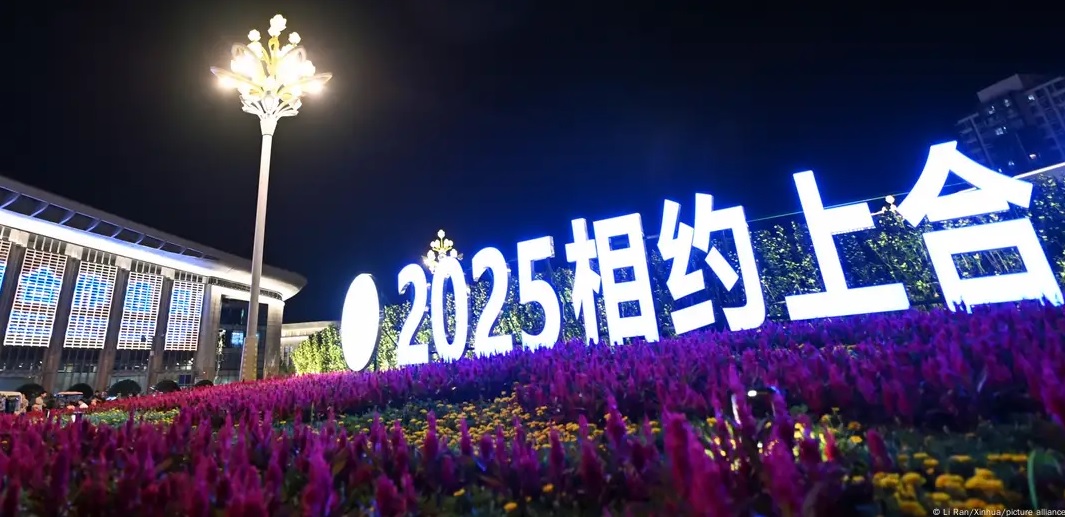Alwaght- Iran's President Masoud Pezeshkian Sunday arrived in China for Shanghai Cooperation Organization (SCO) summit. The visit is providing Tehran with the opportunity to implement the 25-year cooperation pact with Beijing and get further chances to export more oil.
In general, the Iranian-Chinese relations have a long history and since the ancient Silk Road to date, the two nations have maintained their bonds and a common history. At the same time, the visit of the Iranian president gives Tehran an opportunity for a bolder role in the SCO summit.
China hosted the SCO's annual summit on Sunday and Monday, a summit that has already grabbed much attention as it is the largest meeting of the organization since it's establishment in 2001.
Iran is intensifying its diplomatic efforts to secure a more prominent role within organization, a move analysts say is central to its strategic "Look East" policy. This pivot is widely seen as a strategy to counter international isolation, military threats, and to bolster its position against potential aggression.
Tehran's focus on deepening ties with major Eastern powers like Russia, China, and India is a top priority. These partnerships are aimed at driving economic cooperation, safeguarding national sovereignty, and reinforcing Iran's standing as a key regional actor. In this context, membership in the SCO is viewed by Tehran as a valuable platform to advance both its diplomatic and economic ambitions.
Timing significance of Pezeshkian’s SCO presence
After the recent war Israel waged against Iran in June in the strength of the US, Tehran diplomatic interactions with its Eurasian partners has increased. In the 25th meeting of the SCO foreign ministers held less than two months ago, Iran's Foreign Minister Abbas Araghchi held several meetings with the Russian counterpart Sergey Lavrov, Chinese counterpart Wang Yi, and Indian counterpart Subrahmanyam Jaishankar. He also held a short talk with the Chinese President Xi Jinping.
During their talks with Iranian officials, Russia and China condemned Israeli attacks on Iranian soil and nuclear facilities, stressing the need for multilateral dialogue to reduce regional tensions. Moscow also reaffirmed its support for Iran in international forums, particularly the UN Security Council.
Separately, Iran's engagement with China highlighted the potential for advancing the two countries' comprehensive strategic partnership. Beijing has declared its support for Tehran's sovereignty and security, and the two nations are working to enhance business ties. Similarly, discussions with India have focused on expanding bilateral relations and regional coordination.
Diplomacy range in Asia
The recent visits of the Iranian FM and the coming meetings of the Iranian president in China underscore the active diplomacy of Tehran with Eurasian countries, suggesting that Iran is seeking active engagement in the SCO. In fact, through the SCO, Iran is making stronger alliances to diplomatic support, economic partnerships, and logistical support from the key SCO powers.
As two UNSC permanent members, China and Russia are the strategic anchors of Iran. The two countries have already asserted their opposition to military action of Israel against Iran. Also, joint opposition to the Western sanctions and interventions have created a proper atmosphere for further Chinese and Russian cooperation with the Islamic Republic of Iran.
India's trade role
Recent talks between Iranian FM and Indian officials indicate that Tehran is seeking to draw New Delhi closer by positioning itself as a logistical hub for Eurasia. A key element of this strategy is the development of the International North-South Transport Corridor (INSTC), which connects Iran's ports to Russia and India.
The visits made by Araghchi within the SCO frame over the past two months underscore Tehran's commitment to a multipolar world order. The engagements demonstrate Iran's intent to counter Western pressure by taking on a more active role in Eurasian blocs like the SCO. These meetings also highlight the growing importance of the SCO and BRICS blocs as strategic counterweights for Iran against Western influence.
Iran's technical priorities in engagements with SCO
As it expands its relations with the SCO members, Iran needs to make ground for some of its infrastructural priorities.
Italian analyst Silvia Boltuc, managing director of the SpecialEurasia institute, has outlined several key priorities for Iran:
— Completing the Rasht-Astara railway, as critical section of the International North-South Transport Corridor (INSTC). This corridor enables direct trade from Russia through Iran to India.
— Formalizing and implementing recent bilateral trade agreements signed with China and Russia, focusing on energy infrastructure, barter systems, and transactions in local currencies.
- Renewing or expanding military cooperation and arms deals with Russia, particularly following Moscow's public criticism of Israeli attacks.
- Diversifying oil export routes away from the Strait of Hormuz and developing alternative corridors. This is especially critical if Iran faces new maritime threats following West's snapback mechanism that seeks to reinstate all sanctions.
- Stepping up diplomatic engagement with member states of BRICS and SCO.



























